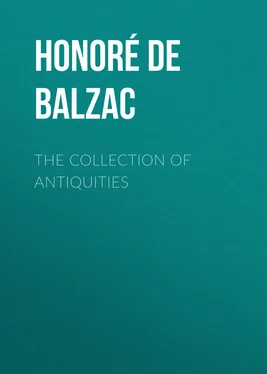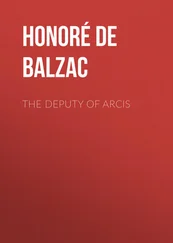Honoré Balzac - The Collection of Antiquities
Здесь есть возможность читать онлайн «Honoré Balzac - The Collection of Antiquities» — ознакомительный отрывок электронной книги совершенно бесплатно, а после прочтения отрывка купить полную версию. В некоторых случаях можно слушать аудио, скачать через торрент в формате fb2 и присутствует краткое содержание. Жанр: literature_19, foreign_antique, foreign_prose, на английском языке. Описание произведения, (предисловие) а так же отзывы посетителей доступны на портале библиотеки ЛибКат.
- Название:The Collection of Antiquities
- Автор:
- Жанр:
- Год:неизвестен
- ISBN:нет данных
- Рейтинг книги:5 / 5. Голосов: 1
-
Избранное:Добавить в избранное
- Отзывы:
-
Ваша оценка:
- 100
- 1
- 2
- 3
- 4
- 5
The Collection of Antiquities: краткое содержание, описание и аннотация
Предлагаем к чтению аннотацию, описание, краткое содержание или предисловие (зависит от того, что написал сам автор книги «The Collection of Antiquities»). Если вы не нашли необходимую информацию о книге — напишите в комментариях, мы постараемся отыскать её.
The Collection of Antiquities — читать онлайн ознакомительный отрывок
Ниже представлен текст книги, разбитый по страницам. Система сохранения места последней прочитанной страницы, позволяет с удобством читать онлайн бесплатно книгу «The Collection of Antiquities», без необходимости каждый раз заново искать на чём Вы остановились. Поставьте закладку, и сможете в любой момент перейти на страницу, на которой закончили чтение.
Интервал:
Закладка:
But for these explanations which depict one side of provincial life in the time of the Empire and the Restoration, it would not be easy to understand the opening scene of this history, an incident which took place in the great salon one evening towards the end of October 1822. The card-tables were forsaken, the Collection of Antiquities – elderly nobles, elderly countesses, young marquises, and simple baronesses – had settled their losses and winnings. The master of the house was pacing up and down the room, while Mlle. Armande was putting out the candles on the card-tables. He was not taking exercise alone, the Chevalier was with him, and the two wrecks of the eighteenth century were talking of Victurnien. The Chevalier had undertaken to broach the subject with the Marquis.
“Yes, Marquis,” he was saying, “your son is wasting his time and his youth; you ought to send him to court.”
“I have always thought,” said the Marquis, “that if my great age prevents me from going to court – where, between ourselves, I do not know what I should do among all these new people whom his Majesty receives, and all that is going on there – that if I could not go myself, I could at least send my son to present our homage to His Majesty. The King surely would do something for the Count – give him a company, for instance, or a place in the Household, a chance, in short, for the boy to win his spurs. My uncle the Archbishop suffered a cruel martyrdom; I have fought for the cause without deserting the camp with those who thought it their duty to follow the Princes. I held that while the King was in France, his nobles should rally round him. – Ah! well, no one gives us a thought; a Henry IV. would have written before now to the d’Esgrignons, ‘Come to me, my friends; we have won the day!’ – After all, we are something better than the Troisvilles, yet here are two Troisvilles made peers of France; and another, I hear, represents the nobles in the Chamber.” (He took the upper electoral colleges for assemblies of his own order.) “Really, they think no more of us than if we did not exist. I was waiting for the Princes to make their journey through this part of the world; but as the Princes do not come to us, we must go to the Princes.”
“I am enchanted to learn that you think of introducing our dear Victurnien into society,” the Chevalier put in adroitly. “He ought not to bury his talents in a hole like this town. The best fortune that he can look for here is to come across some Norman girl” (mimicking the accent), “country-bred, stupid, and rich. What could he make of her? – his wife? Oh! good Lord!”
“I sincerely hope that he will defer his marriage until he has obtained some great office or appointment under the Crown,” returned the gray-haired Marquis. “Still, there are serious difficulties in the way.”
And these were the only difficulties which the Marquis saw at the outset of his son’s career.
“My son, the Comte d’Esgrignon, cannot make his appearance at court like a tatterdemalion,” he continued after a pause, marked by a sigh; “he must be equipped. Alas! for these two hundred years we have had no retainers. Ah! Chevalier, this demolition from top to bottom always brings me back to the first hammer stroke delivered by M. de Mirabeau. The one thing needful nowadays is money; that is all that the Revolution has done that I can see. The King does not ask you whether you are a descendant of the Valois or a conquerer of Gaul; he asks whether you pay a thousand francs in tailles which nobles never used to pay. So I cannot well send the Count to court without a matter of twenty thousand crowns – ”
“Yes,” assented the Chevalier, “with that trifling sum he could cut a brave figure.”
“Well,” said Mlle. Armande, “I have asked Chesnel to come to-night. Would you believe it, Chevalier, ever since the day when Chesnel proposed that I should marry that miserable du Croisier – ”
“Ah! that was truly unworthy, mademoiselle!” cried the Chevalier.
“Unpardonable!” said the Marquis.
“Well, since then my brother has never brought himself to ask anything whatsoever of Chesnel,” continued Mlle. Armande.
“Of your old household servant? Why, Marquis, you would do Chesnel honor – an honor which he would gratefully remember till his latest breath.”
“No,” said the Marquis, “the thing is beneath one’s dignity, it seems to me.”
“There is not much question of dignity; it is a matter of necessity,” said the Chevalier, with the trace of a shrug.
“Never,” said the Marquis, riposting with a gesture which decided the Chevalier to risk a great stroke to open his old friend’s eyes.
“Very well,” he said, “since you do not know it, I will tell you myself that Chesnel has let your son have something already, something like – ”
“My son is incapable of accepting anything whatever from Chesnel,” the Marquis broke in, drawing himself up as he spoke. “He might have come to you to ask you for twenty-five louis – ”
“Something like a hundred thousand livres,” said the Chevalier, finishing his sentence.
“The Comte d’Esgrignon owes a hundred thousand livres to a Chesnel!” cried the Marquis, with every sign of deep pain. “Oh! if he were not an only son, he should set out to-night for Mexico with a captain’s commission. A man may be in debt to money-lenders, they charge a heavy interest, and you are quits; that is right enough; but Chesnel ! a man to whom one is attached! – ”
“Yes, our adorable Victurnien has run through a hundred thousand livres, dear Marquis,” resumed the Chevalier, flicking a trace of snuff from his waistcoat; “it is not much, I know. I myself at his age – But, after all, let us let old memories be, Marquis. The Count is living in the provinces; all things taken into consideration, it is not so much amiss. He will not go far; these irregularities are common in men who do great things afterwards – ”
“And he is sleeping upstairs, without a word of this to his father,” exclaimed the Marquis.
“Sleeping innocently as a child who has merely got five or six little bourgeoises into trouble, and now must have duchesses,” returned the Chevalier.
“Why, he deserves a lettre de cachet!”
“‘They’ have done away with lettres de cachet,” said the Chevalier. “You know what a hubbub there was when they tried to institute a law for special cases. We could not keep the provost’s courts, which M. de Bonaparte used to call commissions militaires.”
“Well, well; what are we to do if our boys are wild, or turn out scapegraces? Is there no locking them up in these days?” asked the Marquis.
The Chevalier looked at the heartbroken father and lacked courage to answer, “We shall be obliged to bring them up properly.”
“And you have never said a word of this to me, Mlle. d’Esgrignon,” added the Marquis, turning suddenly round upon Mlle. Armande. He never addressed her as Mlle. d’Esgrignon except when he was vexed; usually she was called “my sister.”
“Why, monsieur, when a young man is full of life and spirits, and leads an idle life in a town like this, what else can you expect?” asked Mlle. d’Esgrignon. She could not understand her brother’s anger.
“Debts! eh! why, hang it all!” added the Chevalier. “He plays cards, he has little adventures, he shoots, – all these things are horribly expensive nowadays.”
“Come,” said the Marquis, “it is time to send him to the King. I will spend to-morrow morning in writing to our kinsmen.”
“I have some acquaintance with the Ducs de Navarreins, de Lenoncourt, de Maufrigneuse, and de Chaulieu,” said the Chevalier, though he knew, as he spoke, that he was pretty thoroughly forgotten.
Читать дальшеИнтервал:
Закладка:
Похожие книги на «The Collection of Antiquities»
Представляем Вашему вниманию похожие книги на «The Collection of Antiquities» списком для выбора. Мы отобрали схожую по названию и смыслу литературу в надежде предоставить читателям больше вариантов отыскать новые, интересные, ещё непрочитанные произведения.
Обсуждение, отзывы о книге «The Collection of Antiquities» и просто собственные мнения читателей. Оставьте ваши комментарии, напишите, что Вы думаете о произведении, его смысле или главных героях. Укажите что конкретно понравилось, а что нет, и почему Вы так считаете.












